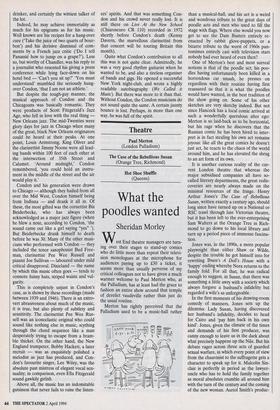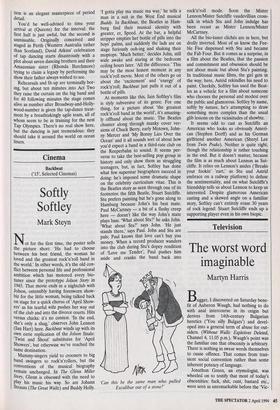Theatre
Paul Merton (London Palladium) The Case of the Rebellious Susan (Orange Tree, Richmond) Hot Shoe Shuffle (Queens)
What the poodles wanted
Sheridan Morley
West End theatre managers are turn- ing over their stages to stand-up comics who do little more than repeat their televi- sion monologues at the microphone for audiences paying up to £30 a ticket, it seems more than usually perverse of my critical colleagues not to have given a much warmer welcome to Paul Merton who, at the Palladium, has at least had the grace to fashion an entire show around that temple of derelict vaudeville rather than just do the usual routine.
Merton has rightly perceived that the Palladium used to be a music-hall rather than a musical-hall, and his act is a weird and wondrous tribute to the great days of poodle acts and men who used to fill the stage with flags. Where else would you now get to see the Dam Busters entirely re- enacted by rabbit glove-puppets, or a bizarre tribute to the worst of 1960s pan- tomimes entirely cast with television stars nobody had ever heard of even then?
One of Merton's best and most surreal notions is that of the poodle act; his poo- dles having unfortunately been killed in a horrendous car smash, he presses on regardless with their routine having first reassured us that it is what the poodles would have wanted, in the best tradition of the show going on. Some of his other sketches are very sketchy indeed. But not since Hancock has a local comic arrived at such a wonderfully querulous alter ego: Merton is so laid-back as to be horizontal, but his rage when he discovers that the Russian comic he has been hired to inter- pret is in fact stealing his own act remains joyous: like all the great comics he doesn't just act, he reacts to the chaos of the world around him, and he has elevated the shrug to an art form of its own.
It is another curious reality of the cur- rent London theatre that whereas the major subsidised companies all have so- called literary departments, the great redis- coveries are nearly always made on the minimal resources of the fringe. Henry Arthur Jones's The Case of Rebellious Susan, written exactly a century ago, should long since have turned up on a National or RSC trawl through late Victorian theatre, but it has been left to the ever-enterprising Sam Walters at the Orange Tree in Rich- mond to go down to his local library and turn up a period piece of immense fascina- tion.
Jones was, in the 1890s, a more popular playwright than either Shaw or Wilde, despite the trouble he got himself into for rewriting Ibsen's A Doll's House with a 'happy' ending whereby Nora returns to the family fold. For all that, he was radical enough to suggest, in Susan, that there was something a little awry with a society which always forgave a husband's infidelity but regarded a wife's as unforgivable.
In the first moments of his drawing-room comedy of manners, Jones sets up the dilemma: Lady Susan, having discovered her husband's infidelity, decides to head for Cairo and 'pay him back in his own kind'. Jones, given the climate of the times and demands of his first producer, was canny enough to leave us in the dark about what precisely happens up the Nile. But his debate rages across three acts of guarded sexual warfare, in which every point of view from the chauvinist to the suffragette gets a character to speak up for it. Malcolm Sin- clair is perfectly in period as the lawyer- uncle who has to hold the family together as moral absolutes crumble all around him with the turn of the century and the coming of the new woman. Auriol Smith's produc- tion is an elegant masterpiece of period detail.
You'd be well-advised to time your arrival at (Queens) for the interval: the first half is just awful, but the second is umnissable. Originally conceived and staged in Perth (Western Australia rather than Scotland), David Atkins' celebration of tap dancing starts disastrously with a plot about seven dancing brothers and their Amazonian sister (Rhonda Burchmore) trying to claim a legacy by performing the show their father always wished to see.
Rehearsals and fit-up are terminally bor- ing, but about ten minutes into Act Two they raise the curtain on the big band and for 40 following minutes the stage comes alive as number after Broadway-and-Holly- wood-number is given the tap-dance treat- ment by a breathtakingly agile team, all of Whom seem to be in training for the next Tap Olympics. There's no real show here, but the dancing is just tremendous: they should take it around the world on ocean liners.



























































 Previous page
Previous page